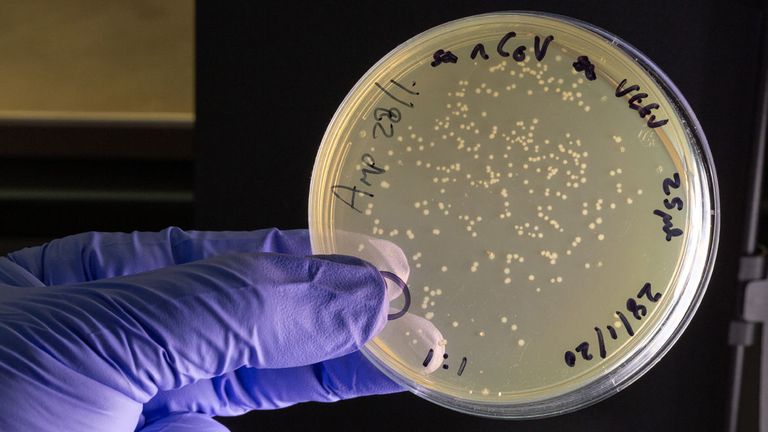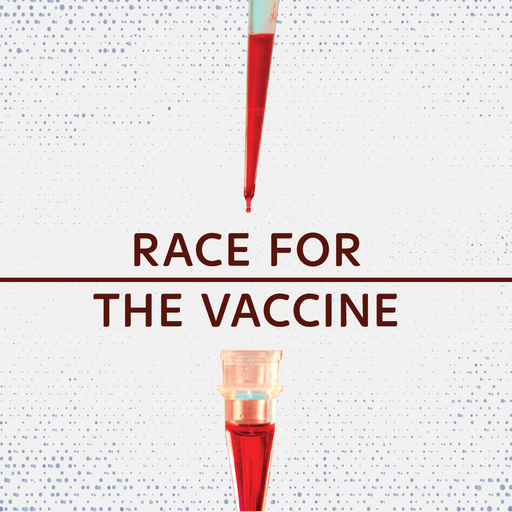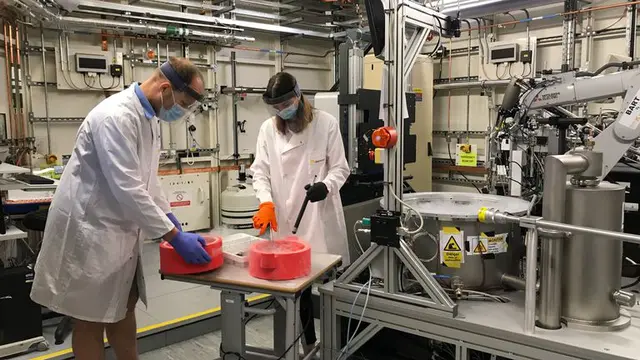Scientists are screening a vast back catalogue of potential drugs in the hope of accelerating the hunt for a coronavirus cure.
The team at Oxford-based Exscientia is scanning 12,000 compounds that have been investigated as treatments in other diseases and have passed early stage safety trials.
They believe the experimental drugs may, by chance, have a chemical structure that could stop
the virus
entering human cells and making copies of itself.

Former top health official: Vaccine hopes should be tempered
And by re-purposing them to target SARS-CoV-2, the virus that causes
COVID-19
, the treatment could be fast-tracked into clinical trials within a few months.
Dr Aude Echalier, scientific coordinator at the company, told Sky News that the strategy could shave several years off the usual decade-long development time for a new medicine.
"We are in the context of a new disease; SARS-Cov-2 is a new virus. There is a lot to learn.
"The faster we can target different proteins, and try which is the right one to target to develop a new treatment against COVID-19, the better."
The catalogue contains almost every drug that has been tested in clinical and pre-clinical trials.
Most have been developed to treat conditions completely unrelated to infectious disease. Any activity against the coronavirus will be an accident of design.

The race for a vaccine
The scientists are using artificial intelligence to rapidly screen the compounds for a likely match with vulnerable areas of the virus.
They have already had several hits, which are now being confirmed in further tests.
"Drug discovery is a needle in a haystack," said Dr Echalier.
"We are trying to rationalise this hunt as much as we can to put all the chance on our side."
**:: Listen to the Daily podcast on **
Apple Podcasts
**, Google Podcasts
, Spotify
, Spreaker
**
The main collection of compounds is held by Scripps Research in California and is funded by the Bill and Melinda Gates Foundation. Samples were sent to Exscientia a month ago.
The use of artificial intelligence, with computer algorithms learning what molecular features make for effective drugs, has already resulted in a potential treatment for obsessive-compulsive disorder starting clinical trials just 12 months after being discovered. Normally the process would take at least four years.
Exscientia is collaborating with scientists running Diamond Light Source, the UK's most powerful microscope, to visualise how individual atoms that make up the virus interact with a potential drug.
It will allow them to tweak the chemical structure of the compounds to make them even more effective.
Diamond Light Source uses a beam of light ten billion times brighter than the sun and is 10,000 times more powerful than a traditional microscope.
The extraordinary detail is also enabling scientists at the facility to work with chemists around the world to design the 'perfect' anti-viral drug, atom by atom. It's called the COVID Moonshot and it has already found one serious candidate.
Professor Frank von Delft, a senior scientist at Diamond, said: "For the immediate need finding a compound that is safe and clinically available would make a massive difference, but in the long term you want to whack the virus very quickly and very hard to be as effective as possible.
"And that's when you go back to the drawing board and design from the bottom up."
 简体中文
简体中文

